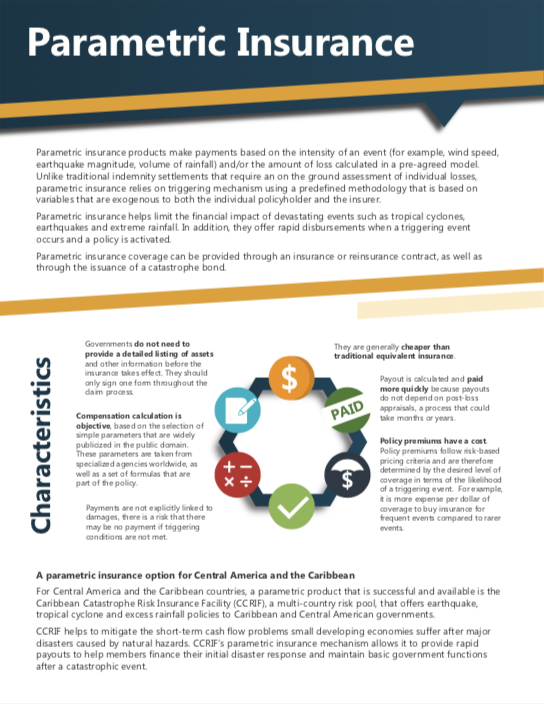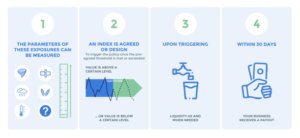
Risk of Parametric Insurance in the United Kingdom
Risk of Parametric Insurance in UK
With parametric insurance becoming more and more prominent, a significant shift in the ever-changing insurance market is taking place. This creative approach to risk management is becoming more and more popular, especially in the UK where the conventional insurance industry is going through a major transformation. The main features of parametric insurance are examined in this article, along with its benefits, drawbacks, and expanding market share in the UK.
Understanding Parametric Insurance: A conceptual Overview
A change from the conventional indemnity-based paradigm is represented by parametric insurance. Parametric insurance pays out fixed sums when particular triggering events take place, in contrast to traditional insurance policies that reimburse policyholders based on actual losses sustained. These occurrences may frequently be measured and independently verified, which facilitates a quicker claims procedure.
Advantages of Parametric Insurance
The efficiency of parametric insurance is one of its main benefits. Incorporating objective metrics like seismic activity, meteorological trends, or economic indicators can expedite and improve the transparency of the claims settlement process. By eschewing subjective loss estimations, this reduces disagreements and speeds up policyholders’ reimbursement.

Parametric Insurance in the UK: A Growing Trend
The use of parametric insurance has increased dramatically in the UK in recent years across a number of industries. This model’s adaptability allows it to be used in a variety of industries, such as energy, agriculture, and even events. Let’s examine how parametric insurance is becoming more and more popular in these many field.
Agricultural Sector: Shielding Farmers from Unpredictable Weather Events
Farmers in the United Kingdom are accustomed to erratic weather patterns. The use of parametric insurance in agriculture has grown in favor as a defense against unfavorable weather events like droughts and heavy precipitation. Farmers receive reimbursement based on established weather parameters, eliminating the need to wait for a typical claims adjuster to evaluate the level of crop damage and guaranteeing a speedy recovery.
Energy Industry: Mitigating Risks in Renewable Energy Ventures
The UK’s energy sector is facing particular difficulties as it continues to shift to renewable energy sources. In order to provide a customized solution, parametric insurance covers particular weather phenomena that may have an influence on energy generation. Wind farm operators might receive compensation if wind speeds reach or exceed specific benchmarks, reducing financial losses due to less-than-ideal energy outpu

Event Insurance: Ensuring Security for Organizers and Participants
The UK events industry has adopted parametric insurance as a method for managing cancellation and disruption risks. Event organizers can designate triggering events, such as bad weather or unforeseen circumstances, without the need for drawn-out claims investigations, and receive predetermined rewards. This strategy promotes confidence in the sector by offering financial stability to event organizers and attendees alike.
Parametric vs. Traditional Insurance: Bridging the Gap
Parametric insurance has many benefits; there are drawbacks as well. Knowing how it enhances rather than replaces conventional insurance models is essential to its incorporation into the insurance industry. Developing a thorough risk management plan requires finding a balance between parametric and traditional coverage.
Complementary Nature of Parametric Insurance
When it comes to addressing particular, well-defined risks, parametric insurance works very well. It is a great alternative to traditional insurance, which could take longer to process claims due to its prompt response to initiating events. Businesses can attain a comprehensive risk management strategy that incorporates the benefits of parametric and indemnity-based insurance by merging the two models.
Regulatory Landscape: Adapting to the Evolution of Insurance
Regulatory organizations are navigating the requirement for proper frameworks to manage this evolving sector as parametric insurance becomes more popular in the UK. In order to protect consumers, promote innovation, and shape the future of parametric insurance, regulations are essential.
Regulatory Considerations for Parametric Insurance
The Financial Conduct Authority (FCA) and the Prudential Regulation Authority (PRA) are now in the process of developing parametric insurance principles and regulations. It’s difficult to strike a balance between promoting innovation and defending the interests of customers. For parametric insurance to grow sustainably in the UK market, the regulatory framework needs to change in step with the dynamic nature of the product.
Challenges and Future Prospect
Parametric insurance has a promising future, yet problems still exist. It is imperative for stakeholders to comprehend these obstacles if they are to fully utilize this inventive methodology. Furthermore, examining potential future developments offers insights into how parametric insurance might continue to change the risk management environment.
Challenges in Parametric Insurance Implementation
A significant obstacle is precisely identifying and quantifying the triggering events. For parametric insurance to be successful and equitable, accuracy is essential. Finding the ideal parametric model balance between accuracy and simplicity is still a problem that insurers, data scientists, and industry experts must work together to solve.
Future Prospects: Technological Advancements and Expanded Applications
Future developments in technology will have a significant impact on parametric insurance in the UK. The accuracy of parametric models may be improved by utilizing machine learning, artificial intelligence, and advanced data analytics. Furthermore, parametric insurance may find uses in fields outside of its current purview as industries continue to change, opening up new avenues for innovation.
Conclusion: A Transformative Path Forward
The emergence of parametric insurance in the UK represents a paradigm shift in the way that organizations and individuals handle risk. In a world where things are becoming more unexpected, its effectiveness, transparency, and adaptability make it a tempting option. The future of risk management in the United Kingdom is expected to be influenced by the interaction between parametric and traditional insurance models. This anticipation is based on the persistence of such interaction as technological improvements and legal frameworks evolve.
The rise of parametric insurance in the UK signals a revolutionary development in the field of risk management. This paradigm change shows how resilient the sector is, setting the stage for a time in the future when efficiency and adaptability will be crucial
Embracing Innovation for a Resilient Future It is essential to embrace the inventive spirit of parametric insurance as the insurance industry transforms.
This is the transformative road forward. Businesses, individuals negotiate uncertainty, adapt agilely, quickly respond to changing risk landscapes due to this synergy.
Empowering Businesses and Individuals
The inherent openness and efficiency of parametric insurance benefit both individuals and corporations. Combined with predetermined triggers, quick claims processing speeds up recovery and gives policyholders confidence. Beyond monetary compensation, this empowerment promotes stability and security in the face of unanticipated circumstances.
Collaborative Approaches for Sustainable Growth
Innovations in technology, regulators, and insurers must work together to pave the way forward. The Financial Conduct Authority (FCA) and the Prudential Regulation Authority (PRA), among other regulatory authorities, are essential in creating an atmosphere that supports the long-term expansion of parametric insurance. It takes constant communication and collaboration to strike the correct balance between promoting innovation and guaranteeing consumer protection.
Technological Advancements: A Catalyst for Evolution
Looking ahead, technology improvements are accelerating the development of parametric insurance. Investments in machine learning, artificial intelligence, and data analytics may enhance parametric models. Broadening the use of parametric insurance beyond its present limitations and improving the accuracy of risk assessment creates new opportunities for innovative applications.
Building Resilience in an Unpredictable World
Conclusion: Businesses and individuals must navigate the complexities of an ever-changing landscape, embracing a transformative path forward marked by adaptability, empowerment, and a collective commitment to shaping a more resilient future. The rise of parametric insurance in the UK signals a transformative journey toward building resilience in an unpredictable world. The combination of innovation, collaboration, and technological prowess positions parametric insurance as a cornerstone in the future of risk management.
Risk of Parametric Insurance in UK






3 thoughts on “Risk of Parametric Insurance in UK”